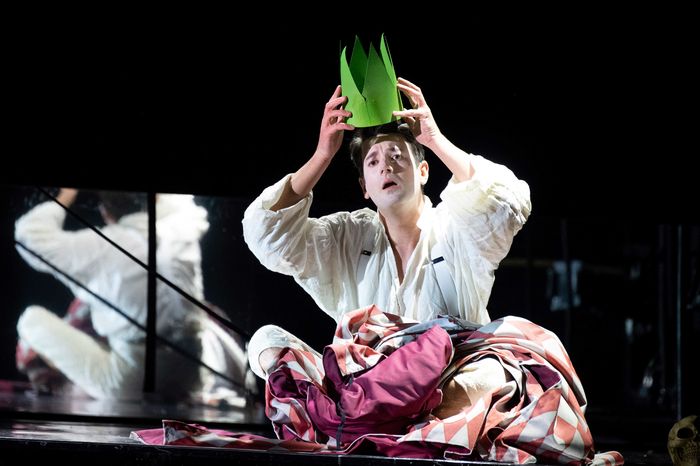‘If you like this comedy, rise cheerfully’: Epicœne at the ADC
Jay Palombella finds this bold reimagining of the Jonson play clever and creative – even if its reach somewhat overshoots its grasp

Performing Ben Jonson is a difficult task and, as such, rarely done well. His plays are so couched in satire, classical allusion and self-indulgent wordplay that, most often, it feels like you’re hosting a live IQ test rather than a piece of theatre – “before you judge, vouchsafe to understand” he writes in the prologue to The New Inn. Yet they are funny, with moments of quick wit, bawdy characters and fanciful subplots that put many modern sitcom writers to shame. So when I learned that Epicœne, or The Silent Woman – one of the lesser performed of Jonson’s already-neglected corpus – was being staged in a bold reimagining at the ADC, my interest was piqued.
Set around the (not at all unusual) premise of trying to trick an old miser out of his will, the play tightly straddles themes of gender, sexuality and identity, all of which come to the forefront of this adaptation. Off the bat, this interpretation by the show’s director, Mark Holland, is clever and creative. It shows an attentive eye to the relevance of the play’s themes for a ‘modern’ audience and demonstrates a strong understanding of character, as the misogynistic world of Jacobean London is swapped in for a not-too-dissimilar, ‘Andrew Tate’-inspired succession of podcast rooms, gyms, clubs and spas.
“This interpretation by the show’s director, Mark Holland, is clever and creative”
The set is minimal and oppressive: Holland tells me at the interval that he didn’t really want any set at all, just the ADC’s blank brick wall, but that he wasn’t allowed it. Nonetheless, his interpretation, which comes to centre around the seedy underbelly of modern-day sex trafficking, drawing on the play’s criminal and sexual motifs, feels gritty and oppressive even without this feature. However, my worry is that Holland, in focusing perhaps too much on this ‘modern’ ITV-crime-drama vision, loses out on the comedy and wit that makes Jonson so wonderful to watch. This comedy, which Samuel Pepys wrote to be “The best comedy, I think, that was ever wrote”, demands at least a bit of space for lighthearted-ness and a few pauses for those moments of euphemistic wordplay: without them, you almost miss the point. This is, after all, believed to be ‘the first West End comedy’, and while I’m not suggesting that Holland’s adaptation needs to be slapstick-funny in every scene (a near impossible task with early modern comedy) you risk undermining the play if don’t pay at least a smidgen of homage.
The acting in this production is hit and miss. The ever-ubiquitous name in Cambridge theatre, Rob Monteiro, plays the old miser, Morose, brilliantly. There is a deft and considerate understanding of character, and he commands the stage of his silent London townhouse admirably. The decision to open with him in some sort of face mask, an allusion to Patrick Bateman of American Psycho, before beginning his daily workout works convincingly. While the overly spritely nature of his performance occasionally veered out of character (he’s meant to be a rich old man near death), this effervescence created a curious undertone to the production’s depiction of a 21st-century health-and-death-obsessed corporate elite, whose legacy and inheritance seem to matter as much at 30 as at 63.
“There is a deft and considerate understanding of character”
Esther Welbrock’s performance as Truewit is wonderful. Her embodiment of the kind of uber-masculinity that Holland’s production takes aim at displays a strong dramatic sensibility, without straying towards the easily-found depths of caricature and clowning. Her final epilogue is engaging and embodies the clear attention to cadence and rhythm that characterises the rest of her intensely appealing portrayal. Other notable turns came from Eliza Harrison as La Foole (amongst others) and Sophia Orr as Daw and Cutbeard – although I don’t know if staging lines of rhymed iambic pentameter like a rap should be left where it began, in 2014. Theo Parkin had the difficult task of playing Epicœne, which demands a great deal from any actor. He’s the butt of the play’s eponymous joke and Holland’s adaptation made this Epicœne more difficult and vulnerable than usual. Parkin handled this challenge well, often playing the character in a drug-induced delirium, and while this sometimes hindered his physicality and stage presence, it was a commendable effort for such a curious part.
I loathe to use the word ‘refreshing’ when writing about adaptations of early modern theatre, so I won’t. Holland’s interpretation, although not always ‘on the mark’ in its detail and direction, is creative and well-informed. It embodies exactly what we should be celebrating about student theatre: its capacity to reimagine and make more clearly relevant the timeless themes of plays like Jonson’s city comedies. Epicœne is perhaps too much of a baptism of fire to begin this theatrical project with, but it certainly is a start.
Epicœne is showing at the ADC Theatre from Tuesday 30th April to Saturday 4th May, at 7:45pm.
 News / Eight Cambridge researchers awarded €17m in ERC research grants27 December 2025
News / Eight Cambridge researchers awarded €17m in ERC research grants27 December 2025 News / Downing investigates ‘mysterious’ underground burial vault 29 December 2025
News / Downing investigates ‘mysterious’ underground burial vault 29 December 2025 News / News in Brief: carols, card games, and canine calamities28 December 2025
News / News in Brief: carols, card games, and canine calamities28 December 2025 Sport / Hard work, heartbreak and hope: international gymnast Maddie Marshall’s journey 29 December 2025
Sport / Hard work, heartbreak and hope: international gymnast Maddie Marshall’s journey 29 December 2025 Interviews / Meet Juan Michel, Cambridge’s multilingual musician29 December 2025
Interviews / Meet Juan Michel, Cambridge’s multilingual musician29 December 2025







